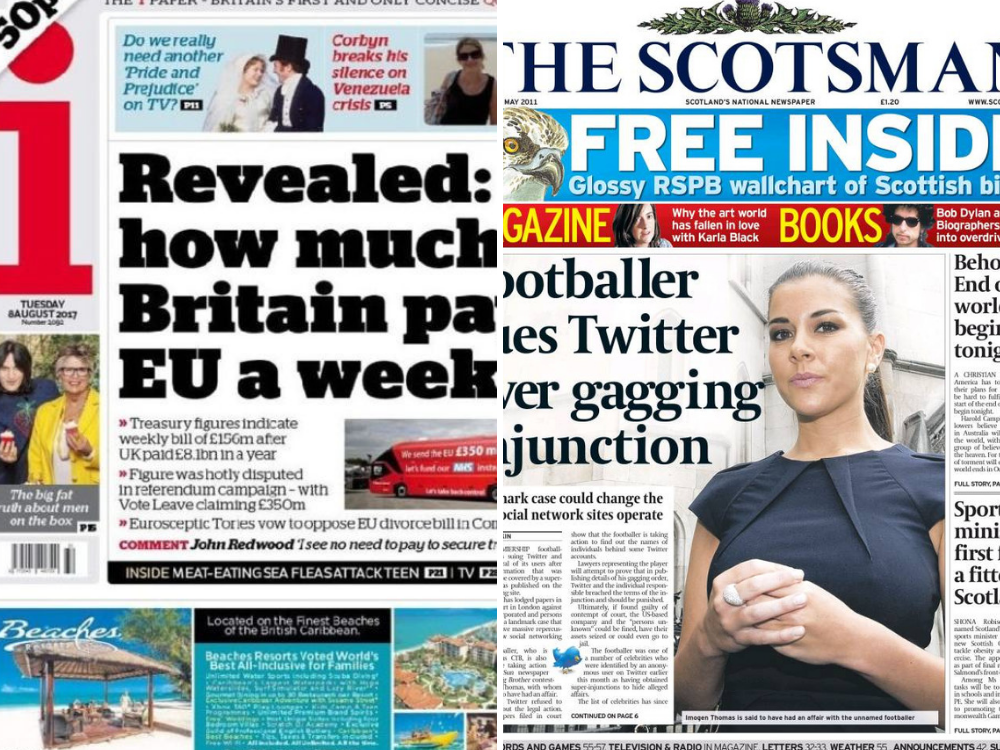
I was at the press conference in 2005 when Andrew Neil announced on behalf of the Barclay brothers that they had sold The Scotsman and its sister titles to Johnston Press for £160m. Trebles all round, as Private Eye would say.
Rather naively I asked whether he was concerned about what the deal would mean for the hundreds of journalists employed by The Scotsman group. I can’t remember his exact reply, but I recall he was incredulous that I was even asking how a business transaction would affect the staff.
Twelve years on we can see that this purchase, and the ones which preceded it, have been disastrous for Johnston Press and contributed to a scenario where the UK’s fourth largest regional newspaper group went into administration last week.
This is a story of how decisions made in the JP boardroom up to 2005, by executives who made their money and then headed for the golf course, have dogged the group and its 200 newspaper titles.
Little did we know in 2005 that we were standing at the high-point of print newspaper profitability in the UK.
That year, JP reported £180m profit on turnover of £520m – a profit margin verging on the greedy at 35 per cent.
Back then it employed 2,122 journalists out of a total workforce of 8,000 and had amassed debts of £643m which, given the huge profits, looked sustainable.
JP’s official motto was “Life is Local” but unofficially it was “Big is Best” as it swallowed up rivals in pursuit of ever greater synergies, share price growth and bigger bonuses for the boardroom fat cats.
But in 2008 the wheels came off the entire UK regional newspaper industry as the economic crash combined with drastic technological change to wipe out the commercial pillars of print advertising: homes, jobs and cars.
Fast forward to the 2017 Johnston Press annual report and we can see that the company had survived, but at terrible cost to its staff who now numbered just a quarter of the 2005 figure.
It made an adjusted operating profit of £33m on turnover of just over £200m last year. A fraction of what it made at the heights, but not too shabby either.
Most businesses would view that as a tidy margin. For a regional newspaper business operating in 2017 it was borderline miraculous.
But the creditors had run out of patience and so the titles were put up for sale in the hope they would get the £220m still outstanding back.
When no buyer, or buyers, with deep enough pockets were found the bondholders (or creditors) took ownership of the titles themselves through a managed administration. The shareholders have been wiped out and members of the pension scheme are also going to lose some of their retirement funds as a result.
At least the titles have survived and the journalists have continuity of employment, but the bondholders will still want to get their money back as quickly as possible.
I worked at Johnston Press during the boom years in the late 1990s when it was making a 40 per cent profit margin. My title, the Battle Observer, had one very junior journalist, paid little more than the cleaners, and half a sub-editor.
Today there are few sub-editors left anywhere in Johnston Press and some titles have no dedicated journalists at all, relying instead on pooled content overseen by distant editors who head-up multiple titles.
Johnston Press still produces many fine newspapers staffed by Stakhanovite journalists who do a great job for their communities under tough conditions. But it seems to me dreadfully unfair that they, and the communities they serve, have less well resourced newsrooms because of the crazy excesses of shareholder capitalism.
Every local newspaper group – big or small, private or public – has declined over the last decade.
In most cases they have grown their audience online but struggled to monetise it sufficiently as advertisers have chosen to mainly spend their cash with two digital giants based in Silicon Valley – Google and Facebook.
But Johnston Press has had things particularly hard as it tried to return profits to shareholders and service an unsustainable debt.
It seems to me that, boom or bust, we place far too little value on local journalism – a service which I would say is a vital public utility. It is too important to be left in the hands of corporate cowboys riding roughshod over the needs of local communities in the search for short-term profitability.
The new owners of Johnston Press now at least have some breathing space.
They have already agreed to wipe out £135m of the outstanding debt, which leaves £85m remaining, to be paid back by December 2023.
My hope is that they take their time to make their money back and shore up the core businesses, taking a longer term view and investing in their core product and USP – quality journalism.
Because while the board counts its profits, from Worthing to Whitby there are communities which count on these papers to be their eyes and ears and the glue which holds them together.
Email pged@pressgazette.co.uk to point out mistakes, provide story tips or send in a letter for publication on our "Letters Page" blog
